Turkmenistan holidays
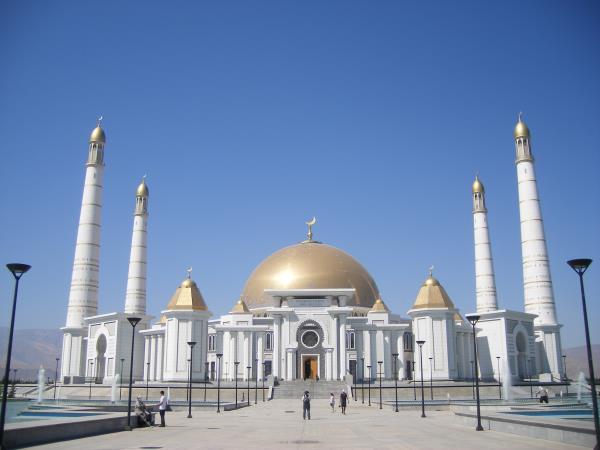
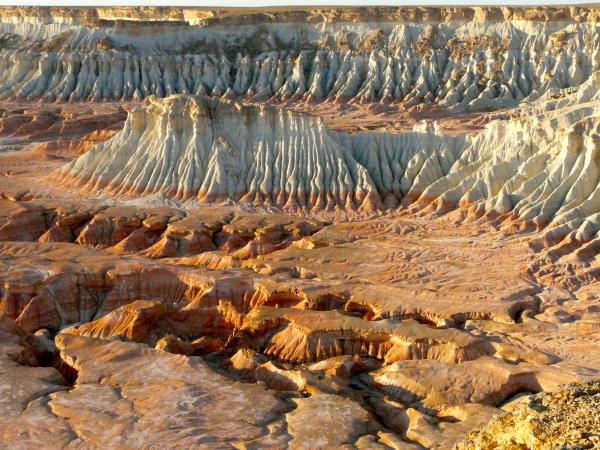
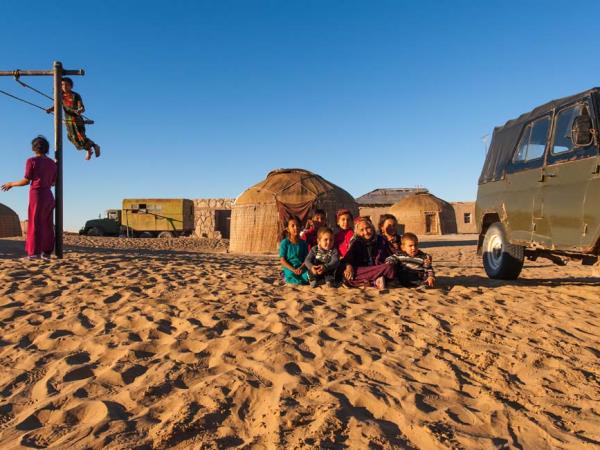
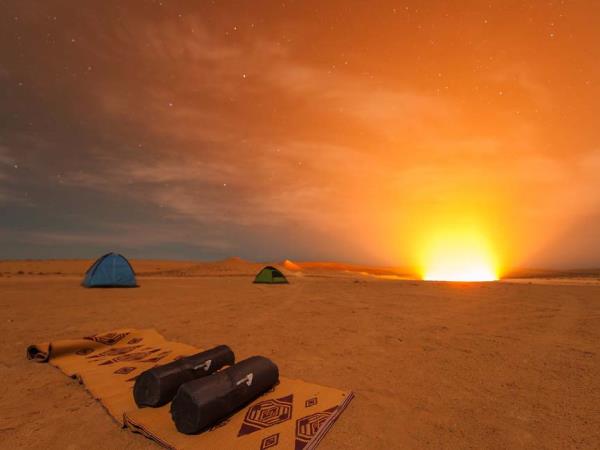
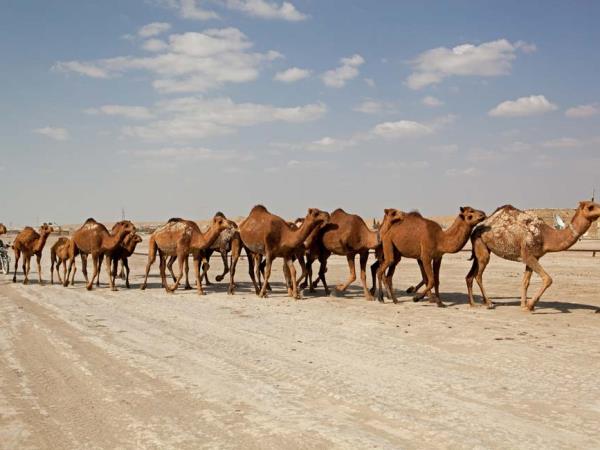
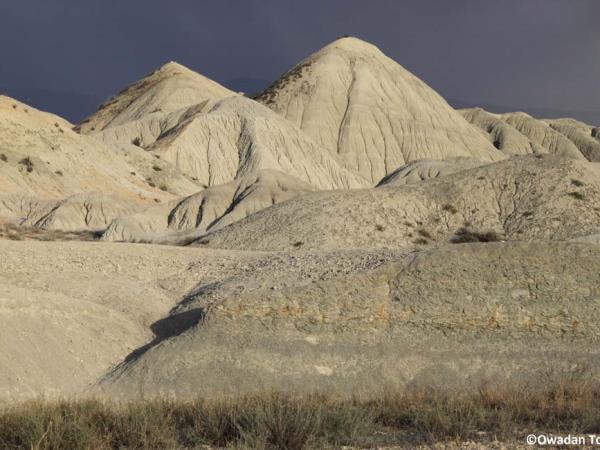
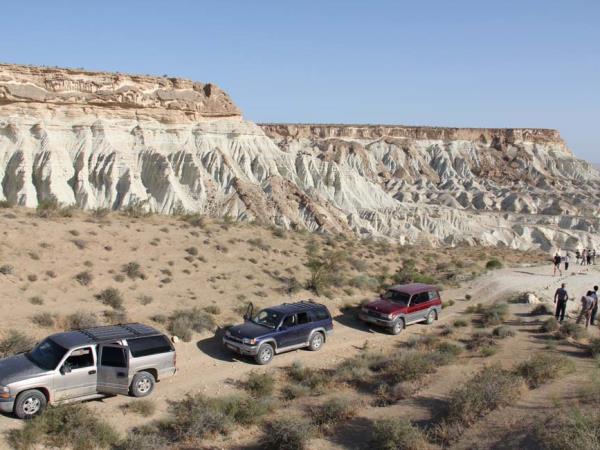
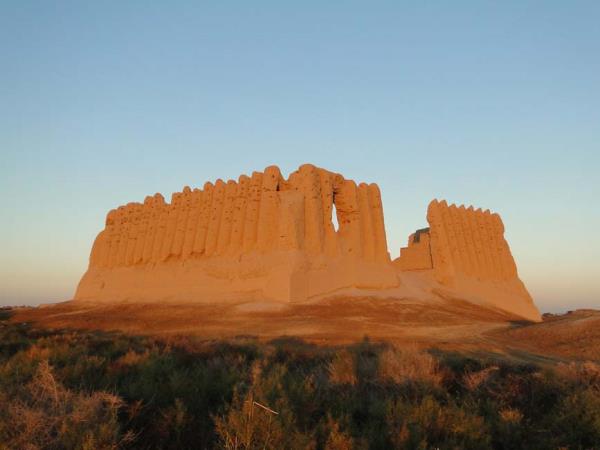
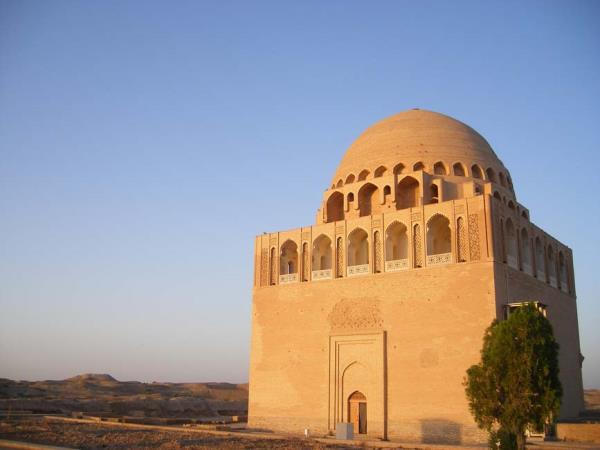
Description of Turkmenistan holidays
Once best known for eccentric former ruler Turkmenbashi, whose cult of personality stretched to naming days of the week after himself, Turkmenistan also happens to be one of Asia’s most unusual and rewarding places to explore.
After perusing the museums and quirky monuments of the capital Ashgabat, you'll head into the wilds to begin a roll call of Turkmenistan's natural wonders, with early entries on the list including underground cave lake of Kowata, the Kopet Dag Mountains and the lunar landscapes of Karakala.
Exploring the striking landscapes of the east, the list of wonders grows to include the stunning green, white and pink coloured canyons of Yangikala, camping in the Kara Kum desert plus sunset camping beside the incredible flaming gas crater at Darwaza.
Human wonders old and new are also scattered across this remarkable country. Among the ancient sites you'll visit ars the UNESCO listed Silk Road ruins of Konye Urgench, the awesome panoply of ancient temples at Merv, the Parthian fortress of Ygdykala, and the Bronze Age site of Gonur Tepe – among humanity's earliest settlements.
There's plenty of fascinating contemporary life to be experienced too, in places like the lively Caspian coastal city of Turkmenbashi (don't miss the fish market) as well as a range of countryside villages where you'll tap into the pulse of a land where people have come travelling since the days of the ancient Silk Road.
Check dates, prices & availability
Travel guides
Reviews
1 Reviews of Turkmenistan holidays
Reviewed on 18 Sep 2023 by Paula Evans
1. What was the most memorable or exciting part of your holiday?
The gas crater was superb. Really had the "wow" factor. The yurt camp at Darwasa was lovely.
2. What tips would you give other travellers booking this holiday?
To tell people at home that they might not hear from you because a lot of internet is blocked and sometimes Impossible to make international calls! Also a lot of time is spent driving because the places of interest are so wide apart.
3. Did you feel that your holiday benefited local people, reduced environmental impacts or supported conservation?
Maybe the villages benefited by us coming because I assume they were paid something. We drove long distances so I don't think that helped the planet any but we did make sure we took all our rubbish with us. Restaurants benefited from our custom.
4. Finally, how would you rate your holiday overall?
It was really good. So many highlights. The desert drivers were great especially ours he was a proper action man! Ashgabat was amazing. The underground lake was strange but good. The desert drivers worked really hard, driving all day then putting up tents and cooking lovely food for us. Only disappointing thing was the hotel in Mary. Flashy on the outside but the worst breakfast I have had anywhere!
Little things like a kettle and cups in the room but no water coffee or tea.
Fantastic breakfast at the yurt camp and when we camped.
Responsible Travel
Planet
This tour travels through some very remote regions, many of which have barely been touched by the presence of humans, and we strongly believe in maintaining their pristine nature. The nature of this trip means that many nights are spent camping. We strive to ensure that we leave these areas as we find them and our team have been trained in strict no litter policies, meaning that we take all refuse to either be recycled or properly disposed of in nearby towns. We use gas for cooking, but on occasions may use firewood – but only where this does not deplete natural resources and deprive local communities from using this themselves. Washing of dishes is carried out well away from any water sources so as not to contaminate them.Much of this trip is spent travelling through the desert. We stick to whatever tracks exist so as to avoid damaging any desert fauna. We also spend time in Kugitang Nature Reserve, where again we stick to the trails when walking – the entrance fees that we pay here help to maintain this vital habitat for Turkmenistan’s wildlife, some of which is endangered, and the fact that we our visit helps to provide employment for local communities means that it is more likely that the wildlife is seen as something to be preserved rather than a short term resource to be exploited.
We work to educate our drivers and other service providers so as to avoid contributing to the litter problem. We ensure that all litter at the yurts is disposed of properly – this means working with the owners to educate them about recycling, and taking waste back to proper disposal sites where possible.
Similarly, in conjunction with our local team we work with hotels and guesthouses to implement best practices when it comes to environmental matters – in some places this is far behind what we might be used to in other parts of the world. This includes basic things like not replacing towels each day, as well as saving electricity and turning lights off – small things but Central Asia is not as used to tourism as countries in western Europe.
People
On all of tours we strive to include a strong focus on local communities and we are firm believers that tourism should have a positive impact on the places visited. On this tour we try to allow our travellers to gain a real insight into the traditional customs of the country; a good example of this is when we stay overnight in the village of Nohur, in homestay accommodation. Not only is this a great experience for travellers but it means that small scale community based tourism projects, often ignored by mainstream tourism, are able to benefit from our visit.Another example is when we visit the pilgrimage site of Gozli Ata. We join local people and travellers are explained the complex customs here which intertwine Islam with older beliefs. We ensure that our travellers are appropriately briefed in order so as not to offend local sensibilities. This also applies to the mosques and that we visit on this trip; it is important that we respect the traditions of the places that we visit.
Some of the sites that we visit are popular attractions, others less so – an example of these is the Parthian fortress of Ygdykala. Relatively few tourists visit here and so the entrance fees that we pay are more critical than in other places in contributing to the preservation of their heritage. These sites are quite fragile, being made mostly of mud brick, and we ensure that our travellers do not unwittingly contribute to their degradation by briefing them on appropriate behaviour.
Parts of Central Asia are very traditional with certain codes of behaviour, and the people here are not always that accustomed to outsiders. We ensure that our travellers are appropriately briefed in order so as not to offend local sensibilities. This also applies to the numerous mosques and mausoleums that we visit on this trip; religion is important here and it is important that we respect these traditions.
We use locally owned suppliers and our partners here are deeply involved with the preservation of the culture and heritage of the country. Where possible we encourage our travellers to spend their money with local businesses; for example when stopping in small villages we encourage our travellers to make purchases from local shops and businesses – a small thing but it helps to spread the economic benefits of tourism. Where possible we buy supplies for our camping expedition from such villages.
We also sometimes offer donations to settlements and family groups – not financial but rather material goods which they may need and appreciate, and which can be hard to come by in the desert regions, such as tea and sugar.
Popular similar holidays
The five stans silk road holiday
From £6449 - £6949 23 days including UK flights
Step into the pages of history on a silk road tour
Uzbekistan & Turkmenistan holiday, Silk Road explorer
From £2999 16 days excluding flights
Discover the fascinating ancient history of the Silk Road
Turkmenistan cultural tour, mysteries of the desert
From £3550 15 days excluding flights
Deserts, dinosaur footprints and mysteries of the Silk Road



















